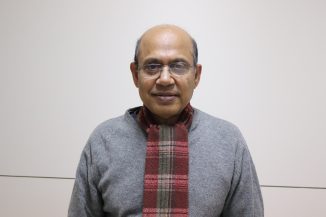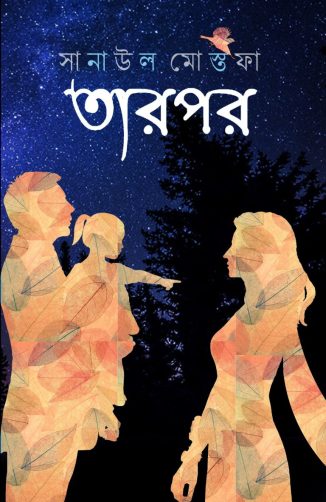Interview of Sanaul Mostafa about his new book TARPOR

- Congratulations on the release of ‘Tarpor’. Tell us something about your book. Some highlights on the story. How is it different from other, earlier romantic fictions that were released recently?
The novel depicts the pain of a non-resident Bangalee (here ‘Akash’), who started a life in a foreign country, but never felt attached to it. He represents many who left behind a failed love, political dream, and a loving community. As time goes by, he feels the increasing urge to reconnect with his homeland, thereby forgetting that the context back home has also changed and become challenging. His journey with his daughter (Sumona) served here as an adventure to rediscover his love (Falguni) and home country.
A novel is generally addressed to an audience. In my case, it was also for me. It provided me the framework to learn writing. I found it fascinating to establish a relationship with the characters and try demonstrating them as real. It was a struggle. Only the readers can say whether I have succeeded.
I find it difficult to put my novel in relation to other fictions as I am not sufficiently exposed to them. However, unlike popular patterns, which include either a happy end or separation, I tried to encourage the readers to invent ‘what next’.
- What kind of books inspire you as a writer? Who are your favourite authors?
I like novels which capture the challenges of social transformations and visualize the dialectic interplay of art and culture, politics, religion, and humanism.
Beside Rabindranath and Nazrul, Sarat Chatterjee, Bibhutibhusan Bandyopadhyay, Humayun Ahmed and Ahmed Sofa are my favourite Bangalee writers. During my student life in Germany, I have come across German literature represented by Thomas Mann, Franz Kafka, Guenter Grass, and Heinrich Boell. In addition, I am fascinated by the great French writer Viktor Hugo and Russian writers Leo Tolstoy and Fyodor Dostoevsky.
- Tell me something about yourself and your background. We understand that you come from a different profession, but then how do you manage time to write?
I am a management consultant, specialized in the non-profit sector. Strategies, entrepreneurship development and non-profit management are my core areas of expertise. I come from a semi-urban area of Bangladesh (Joypurhat) and left for Germany at the age of 19. I have spent nearly half of my life in Germany, and Canada. During my short professional years in Bangladesh, I was a university teacher, researcher, and freelance project management adviser.
I always wanted to write but never managed to spend the time necessary to write. The fear of not finding the right words and style hindered me a lot. Then came the COVID19 months. Finally, I had the time and was encouraged by friends. I think one must make a start even though it’s hard. The next one will come for sure.
- What inspires you to write? Who inspired you to become a writer?
I must admit I have not read much in the recent years. But I watched movies and dramas and was not at all impressed by most of the stories they were based on. I always thought my valuable relationships with the people at large might be also the sources of beautiful stories to write about.
Late Soumitra Chatterjee, my favourite Bangalee actor, was once asked ‘Why are we not having good Bangla films anymore?’ He reacted saying that the contemporary films were seldom based on literary pieces. That hurt me a lot. Since then, I had a dream to write stories. I tend to believe that he has inspired me to write stories.
- What is the response from your readers so far about this book?
I was positively surprised by the initial responses during my debut publication ceremony. Three eminent personalities in Bangladesh observed that the novel touched the real life of many expatriate Bangalees, included some enlightening characters and was worth reading in one sitting. Many readers did not rule out that the story might end up as a film.

- We hear from sources that you have made an audiobook out of your book. Tell our readers something about these developments with your book. Also, are you interested in making a movie out of this book?
Originally, the idea came from a close friend. He liked the novel and thought his children should read it as well. However, they cannot read Bangla, and an English translation was not in the horizon any time soon. His sons represent nearly 12-15 million Bangalees living in foreign countries, who either cannot read Bangla or do not have the possibility to buy the novel or find it more comfortable to listen. Since the story is about a Bangalee expatriate, the urge to reach them out played a significant role. Not to forget, Power Publishers was ready to do it.
I already mentioned that Soumitra Chatterjee has inspired me to write stories. I would be more than happy if the story behind the novel becomes the basis of a film. ‘Film-Literature’ link is what I always dream of.
7. Tell us about your next or upcoming book.
My next novel is ‘Shesh Potra’ and set to be released by May 2022. It depicts a love story of a rural boy during the teen years. The novel shows that even though a relationship does not lead to a way the main actors would like, it can be a source of dreams, emerge as a reference point for human relations and act as a dynamic force in youth.
I am enjoying writing and really dream of authoring a series of stories. The upcoming one ‘Pagolmon’ will be based on our great Liberation War 1971, seen from the perspective of a teen (12 years), who had watched it happening live. I hope to publish it before the Independence Day (16th December) in 2022.
- Any words of advice from your experience for the upcoming young writers on how to set up their career as an author?
Only advice ‘Start writing’. Everybody has a story to share, and mankind will be deprived of your beautiful stories. Therefore, start writing, today, now!

